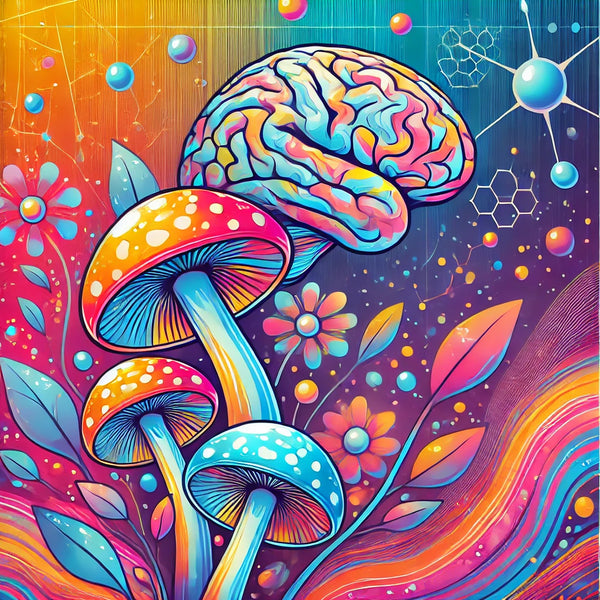
Understanding the Mechanisms of Action of Psilocybin
Introduction
Psilocybin, the active compound found in magic mushrooms, has been making headlines for its potential therapeutic benefits. As research into its effects on mental health continues to grow, understanding the mechanisms of action behind psilocybin's effects is crucial. This blog aims to explain how psilocybin works in the brain, the science behind its therapeutic potential, and why it offers hope for treating various mental health disorders.
What is Psilocybin?
Psilocybin is a naturally occurring psychedelic compound found in certain species of mushrooms, commonly known as magic mushrooms. When ingested, psilocybin is converted by the body into psilocin, a compound that influences the brain's function by interacting with serotonin receptors. This interaction leads to the psychoactive effects associated with psilocybin use, including altered perceptions, mood changes, and cognitive shifts.
The Role of Serotonin
To understand psilocybin's mechanisms of action, it's essential first to grasp the role of serotonin in the brain. Serotonin is a neurotransmitter that plays a crucial role in regulating mood, anxiety, and happiness. It is often called the "feel-good" chemical because of its impact on overall well-being and mental health.
Serotonin Receptors
Serotonin operates through various receptors, each responsible for physiological and psychological processes. The 5-HT2A receptor is particularly significant in the context of psilocybin. This receptor is widely distributed in brain areas involved in cognition, perception, and mood regulation.
How Psilocybin Works
Binding to 5-HT2A Receptors
Once ingested, psilocybin is rapidly converted to psilocin, which then binds to the 5-HT2A receptors in the brain. This binding action is what primarily drives the psychedelic experience. By activating these receptors, psilocin alters the brain's normal functioning, leading to changes in perception, thought processes, and emotional states.
Increased Brain Connectivity
Research using brain imaging techniques has shown that psilocybin increases connectivity between different brain regions. Under normal conditions, various brain networks operate relatively independently. Psilocybin disrupts this segregation, allowing for more integrated and synchronized brain activity. This increased connectivity is believed to contribute to the profound insights and altered states of consciousness reported by users.
Neuroplasticity
One of the most exciting aspects of psilocybin's action in the brain is its potential to promote neuroplasticity. Neuroplasticity is the brain's ability to reorganize itself by forming new neural connections. This is crucial for learning, memory, and recovery from brain injuries.
Enhancing Neural Flexibility
Psilocybin enhances neural flexibility, allowing the brain to break free from rigid, maladaptive patterns of thought and behavior. This can be particularly beneficial for individuals suffering from mental health conditions like depression and anxiety, where negative thought patterns are often entrenched.
Emotional Processing
Psilocybin also impacts emotional processing by modulating activity in the amygdala, a brain region that processes emotions such as fear and anxiety. Studies have shown that psilocybin can reduce the amygdala's reactivity, decreasing negative emotional responses.
Facilitating Emotional Release
By dampening the activity of the amygdala, psilocybin can help individuals confront and process repressed emotions and traumatic experiences. This emotional release is often accompanied by relief and a newfound understanding of personal issues.
Mystical Experiences
One of the hallmark features of psilocybin is its ability to induce mystical or spiritual experiences. These experiences are characterized by a sense of unity, transcendence of time and space, and a feeling of deep interconnectedness with the universe.
Long-term Benefits
Research suggests that the mystical experiences induced by psilocybin can have long-term positive effects on mental health. Individuals often report lasting changes in their attitudes, behaviors, and well-being. These changes are thought to be mediated by the profound psychological insights gained during the psychedelic experience.
Therapeutic Implications
The unique mechanisms of action of psilocybin have significant therapeutic implications. By promoting neuroplasticity, enhancing brain connectivity, and facilitating emotional processing, psilocybin holds promise for treating various mental health conditions.
Depression
Psilocybin has shown considerable potential in treating depression, particularly in individuals who have not responded to conventional treatments. Clinical trials have demonstrated that psilocybin can lead to rapid and sustained reductions in depressive symptoms.
Anxiety
The anxiolytic (anxiety-reducing) effects of psilocybin are another area of interest. Psilocybin-assisted therapy has been found to reduce anxiety in individuals with conditions such as generalized anxiety disorder (GAD) and social anxiety disorder. The reduction in amygdala reactivity and the promotion of emotional release play critical roles in these effects.
Post-Traumatic Stress Disorder (PTSD)
Psilocybin's ability to facilitate the processing of traumatic memories and emotions makes it a promising candidate for treating PTSD. By helping individuals confront and integrate their traumatic experiences, psilocybin-assisted therapy can lead to significant reductions in PTSD symptoms.
Addiction
Psilocybin is also being explored as a treatment for various forms of addiction, including alcohol and nicotine dependence. The compound's ability to disrupt habitual thought patterns and promote profound psychological insights can help individuals break free from addictive behaviors.
Challenges and Considerations
While the potential benefits of psilocybin are substantial, there are also challenges and considerations to keep in mind. Legal restrictions, ethical concerns, and the need for controlled and supportive therapeutic settings are critical factors in the safe and effective use of psilocybin.
Legal Status
Psilocybin is classified as a Schedule I substance in many countries, including the United States, meaning it is considered to have a high potential for abuse and no accepted medical use. However, recent efforts to decriminalize and legalize psilocybin in certain jurisdictions are paving the way for more research and potential therapeutic applications.
Ethical Considerations
The use of psychedelics in therapy raises critical ethical considerations. Ensuring informed consent, providing adequate support during and after the experience, and safeguarding against potential abuse are essential factors that researchers and clinicians must address.
Safe and Supportive Settings
The importance of set and setting cannot be overstated when it comes to psilocybin therapy. "Set" refers to the individual's mindset going into the experience, while "setting" refers to the physical and social environment in which the experience occurs. Ensuring a supportive and safe setting is essential for maximizing the therapeutic benefits of psilocybin.
Conclusion
Psilocybin represents a promising frontier in mental health treatment. Its unique mechanisms of action—ranging from enhancing brain connectivity and promoting neuroplasticity to facilitating emotional processing and inducing mystical experiences—offer a multifaceted approach to healing. As research continues to uncover the therapeutic potential of psilocybin, it holds the promise of revolutionizing the way we approach and treat mental health disorders. By understanding the science behind psilocybin, we can better appreciate its potential to bring about profound and lasting changes in mental health care.
